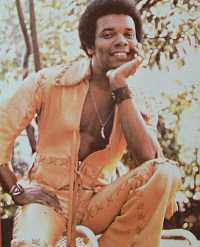Johnny Nash (born August 19, 1940) is an American pop singer-songwriter, best known for his 1972 hit, "I Can See Clearly Now". He was also the first non-Jamaican to record reggae music in Kingston, Jamaica.[citation needed]Contents [hide] 1 Life and career 2 Discography 2.1 Hit singles 2.2 Hit albums 3 References 4 External links
[edit] Life and career
Nash was born John Lester Nash, Jr. in Houston, Texas. He began as a pop singer in the 1950s. He also enjoyed success as an actor early in his career appearing in the screen version of playwright Louis S. Peterson's Take a Giant Step. Nash won a Silver Sail Award for his performance from the Locarno International Film Festival.
In 1965, Johnny Nash and Danny Simms formed the JAD label in New York. One of the more interesting signings was four brothers from Newport, Rhode Island, ages 9, 11, 15 and 16, called The Cowsills. This was before The Cowsills signed with Mercury/Philips with Shelby Singleton and before they signed with MGM and had their first million selling hit single, "The Rain, The Park & Other Things". Nash had his writers writing songs for The Cowsills and they went into the studio in New York with studio musicians and recorded a number of songs like "Either You Do Or You Don't" and "You Can't Go Halfway". Eventually The Cowsills would write and record their own song, "All I Really Want To Be Is Me" which became the group's debut single release on JAD.
Besides "I Can See Clearly Now," Nash recorded several hits in Jamaica, where he travelled in early 1968, as his girlfriend had family links with local TV and radio host and novel writer Neville Willoughby. Nash planned to try breaking the local rocksteady sound in the United States. Willoughby introduced him to a local struggling vocal group, The Wailers. Members Bob Marley, Bunny Wailer and Peter Tosh introduced him to the local scene. Nash signed all three to an exclusive publishing and recording contract with his JAD label and financed some of their recordings, some with Byron Lee's Dragonaires and some with other local musicians such as Jackie Jackson and Lynn Taitt. None of the Marley and Tosh songs he produced were successful. Only two singles were released at the time: "Bend Down Low" (JAD 1968) and "Reggae on Broadway" (Columbia, 1972), which was recorded in London in 1972 on the same sessions that produced "I Can See Clearly Now." It sold over one million copies, and was awarded a gold disc by the R.I.A.A. in November 1972.[1] The I Can See Clearly Now album includes four original Marley compositions published by JAD: "Guava Jelly", "Comma Comma", "You Poured Sugar On Me" and the follow-up hit "Stir It Up". "There Are More Questions Than Answers" was a third hit single taken from the album.
Nash was also active as a composer in the Swedish romance Vill så gärna tro (1971) in which he portrayed Robert. The film soundtrack, partly instrumental reggae with strings, was co-composed by Bob Marley and arranged by Fred Jordan.
JAD Records ceased to exist in 1971, but it was revived in 1997 by American Marley specialist Roger Steffens and French musician and producer Bruno Blum for the "Complete Bob Marley & the Wailers 1967-1972" ten-album series for which several of the Nash-produced Marley and Tosh tracks were mixed or remixed by Blum for release. Nash's biggest hits were the early reggae (rocksteady) tunes "Hold Me Tight" (a #5 hit in the U.S. and the UK) and "Stir It Up", the latter written by Bob Marley prior to Marley's international success. In the UK, his biggest hit was with the song "Tears On My Pillow" which reached number one in the UK Singles Chart in July 1975 for one week.[2] After a hit version of Sam Cooke's "Wonderful World" and "Let’s Go Dancing" in 1979, for many years he seemed to have dropped out of sight; however, in May 2006 he was singing again at SugarHill Recording Studios and at Tierra Studios in his native Houston. Working with SugarHill chief engineer Andy Bradley and Tierra Studios' grammy-winning Randy Miller, he began the work of transferring analog tapes of his songs from the 1970s and 1980s to Pro Tools digital format.[3][4]
Nash sang the opening theme to the 1960s Trans-Lux cartoon The Mighty Hercules. [edit] Discography [edit] Hit singles "A Very Special Love" (1957) # 23 U.S. "The Teen Commandments" (1958, with George Hamilton IV and Paul Anka) #29 U.S. "Hold Me Tight" (1968) # 5 UK # 5 U.S. "You Got Soul" (1969) # 6 UK "Cupid" (1969) # 6 UK # 39 U.S. "I Can See Clearly Now" (1972) # 5 UK # 1 U.S. "Stir It Up" (1972) # 13 UK #12 U.S. "There Are More Questions Than Answers" (1972) # 9 UK "Tears on My Pillow" (1975) # 1 UK "Let's Be Friends" (1975) # 42 UK "(What a) Wonderful World" (1976) # 25 UK "Rock Me Baby" (198UK5) # 47 "I Can See Clearly Now" (re-mix) (1989) # 54 UK [2] [edit] Hit albums 1972: I Can See Clearly Now # 39 UK 1973: My Merry-Go-Round US 1977: Johnny Nash Collection # 18 UK
